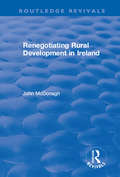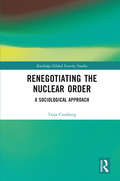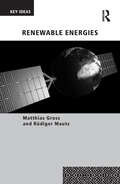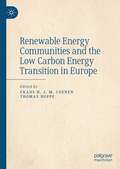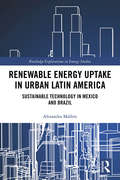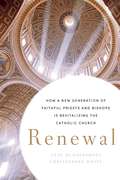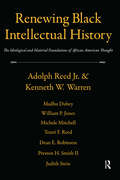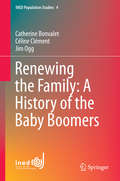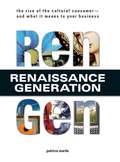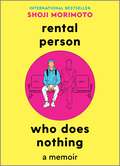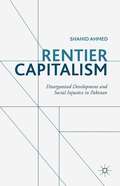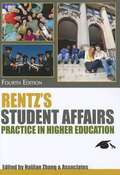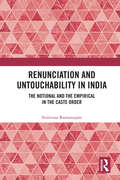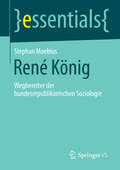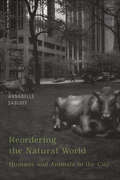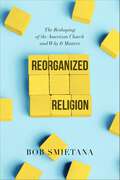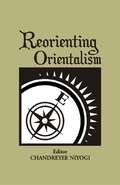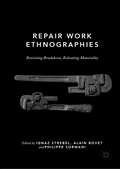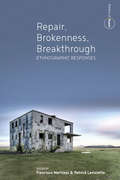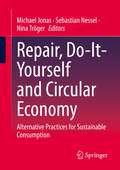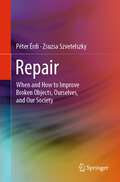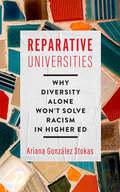- Table View
- List View
Renegotiating Contracts for the Energy Transition in the Extractives Industry (Just Transitions)
by Raphael J. Heffron Damilola S. Olawuyi Victoria R. NaluleThis book focuses on renegotiating extractive contracts to align with the net-zero goals. It delves into extractive contract negotiations in four ways which collectively represent a major research gap in literature. It focuses on extractive contract provisions and examines their alignment with net zero goals, suggesting how these provisions could be re-negotiated to ensure an effective energy transition. Consequently, the book assesses how contractual provisions are responding to, or reflecting energy transition scenarios, and highlights areas to be included or strengthened that will be beneficial for all energy stakeholders. This book goes on to discuss the energy transition global landscape. Through the presentation of case studies from different countries, the book assesses the transition risks in extractive contracts, and it uniquely provides the negotiation tools and strategies to address these transition risks.
Renegotiating Rural Development in Ireland (Routledge Revivals)
by John McDonaghThis title was first published in 2002: As rural Ireland undergoes deep-reaching changes, this book critically assesses what the author terms the "renegotiation of rural development" in Ireland through the repackaging, reproduction and representation of suggestions, ideas and alternatives for rural renewal. Deconstructing the process and practice of rural development in Ireland, the author explores the new approaches to development and the so-called desire for creating integrative policy and planning approaches. The main conduits for this investigation are those of partnership and community groups and their involvement in rural development issues. Further, through investigation of the relevant concepts and theories of rural change, the volume delves into the discourses of rurality and development and utilizes the diversity of approaches and understanding of, this increasingly complex issue.
Renegotiating the Nuclear Order: A Sociological Approach (Routledge Global Security Studies)
by Tarja CronbergRenegotiating the Nuclear Order offers a sociological approach to the nuclear order, and order defined by nuclear technology and nuclear weapons. The focus is on the need to renegotiate the nuclear order, given the conflict between deterrence and disarmament and the unbalanced distribution of rights and responsibilities between the nuclear and nonnuclear states. The study applies the concepts, a relevant social group, and a technological frame developed in the sociology of technology on the current competition between the Non-Proliferation Treaty and the Treaty on the Prohibition on Nuclear Weapons. The negotiations of the nuclear programs of North Korea and Iran form the empirical background. The policy challenges identified in the sociotechnical analysis are threefold. Firstly, there is the need to guarantee the credibility of the nuclear diplomacy in the gap between the “military” and the “peaceful”. Secondly, during the past 50 years the rights of the non-nuclear states have been undermined, while the nuclear-weapon states have ignored their disarmament obligations. There is a need to renegotiate a new balance. Thirdly, the relationship between the two treaties has to be clarified. The proposal is to clearly separate the two into a comprehensive treaty on non-proliferation and to a verifiable treaty on prohibiting nuclear weapons. This book will be of much interest to students of security studies, arms control and disarmament, sociology, STS (Science-Technology-Society) studies, and International Relations.
Renew Orleans?: Globalized Development and Worker Resistance after Katrina (Globalization and Community #27)
by Aaron SchneiderUrban development after disaster, the fading of black political clout, and the onset of gentrification Like no other American city, New Orleans since Hurricane Katrina offers powerful insight into issues of political economy in urban development and, in particular, how a city&’s character changes after a disaster that spurs economic and political transition. In New Orleans, the hurricane upset an existing stalemate among rival factions of economic and political elites, and its aftermath facilitated the rise of a globally oriented faction of local capital. In Renew Orleans? Aaron Schneider shows how some city leaders were able to access fragmented local institutions and capture areas of public policy vital to their development agenda. Through interviews and surveys with workers and advocates in construction, restaurants, shipyards, and hotel and casino cleaning, Schneider contrasts sectors prioritized during post-Katrina recovery with neglected sectors. The result is a fine-grained view of the way labor markets are structured to the advantage of elites, emphasizing how dual development produces wealth for the few while distributing poverty and exclusion to the many on the basis of race, gender, and ethnicity. Schneider shows the way exploitation operates both in the workplace and the community, tracing working-class resistance that joins struggles for dignity at home and work. In the process, working classes and popular sectors put forth their own alternative forms of development.
Renewable Energies (Key Ideas)
by Matthias Gross Rüdiger MautzRenewable Energy normally refers to usable energy sources that are an alternative to fuel sources, but without the negatively evaluated consequences of the replaced fuels. Although energy issues have a long tradition in sociology and other social sciences, it may now be high time to conceptualize these in sociological terms as the lynchpin in our understanding of the way societies are set to develop in the 21st century. This concise book focuses on sociological attempts at better framing contemporary theories of energy transformations and to deliver an accessible overview on the relationships between different types of renewable energy sources and their practical usages in modern societies. A strong focus is laid upon new forms of environmental governance and unavoidable knowledge gaps triggered by attempts to transform contemporary energy systems to renewable ones. Critical topics include the challenge of transition from centralized to decentralized system structures, the integration of renewable energies into existing energy structures or the replacement of these, coping strategies to unforeseen risks and conflict issues, and socio-cultural reservations to new technologies connected to renewable energies.
Renewable Energy Communities and the Low Carbon Energy Transition in Europe
by Thomas Hoppe Frans H. J. M. CoenenThis volume addresses renewable energy communities, and in particular renewable energy cooperatives (REScoops), in the context of the revised EU Renewables Directive. It provides a comprehensive account of the history and development of the renewable energy community movement in over six different countries of continental Europe. It addresses their visions, strategy, organisation, agency, and more particularly the challenges they encounter. This is of particular importance to gain more understanding into how renewable energy communities fare in domestic energy markets where they are confronted with regime institutions, structures and incumbents’ agency that tend to favour maintaining of the status quo while blocking attempts to empower and institutionalise renewable energy communities as market entrants having a disruptive, radical green and localist agenda. This volume will be an invaluable reference for academics and practitioners with an interest in social innovation in sustainable transitions, the role of community energy in energy markets, their agency, as well as an outlook to the impact that the EU Renewables Directive may have to change national legislation and policy frameworks to create a level playing field that is essentially more fair and beneficial to renewable energy communities.
Renewable Energy Uptake in Urban Latin America: Sustainable Technology in Mexico and Brazil (Routledge Explorations in Energy Studies)
by Alexandra MallettThis book explores the perplexing question of how to increase sustainable energy technology use in the developing world, and specifically focuses on two megacities within Latin America. Renewable Energy Uptake in Urban Latin America examines the market and uptake of two sustainable energy technologies (solar water heaters and biogas to produce electricity) in two locations, Mexico City, Mexico and São Paulo, Brazil in the 2000s. Drawing from three systems-based analytical frameworks – including one developed by the author for the purpose of this study – the book examines the varying factors affecting the implementation of renewable energy technologies (RETs) in urban Latin America. These frameworks emphasize the importance of examining socio-political dimensions; rather than conventional explanations that focus on technical and economic aspects only. By doing so, the research improves explanations about renewable energy technology (RET) adoption in the global South. These findings are useful for scholars, policy makers and practitioners working on RET adoption; resulting in a book which helps to inform wider debates regarding innovation, decarbonization, sustainability transitions and energy system change. This book will be of great interest to students and scholars of energy transitions, energy policy, development studies and science and technology studies.
Renewal
by Anne Hendershott Christopher WhiteIn the wake of the clergy abuse scandal of the last decade, many media commentators predicted the "end" of the Catholic priesthood. Demands for an end to celibacy, coupled with calls for women's ordination, dominated discussions on the effectiveness of the Catholic Church in America. Renewal argues that rather than a decline of the priesthood and a diminishing influence of the Catholic Church, we are living in a time of transformation and revitalization. The aging generation of progressives that continues to lobby Church leaders to change Catholic teachings on reproductive rights, same-sex marriage and women's ordination is being replaced by younger men and women who are attracted to the Church because of the very timelessness of its teachings.
Renewing Black Intellectual History: The Ideological and Material Foundations of African American Thought
by Adolph Reed Kenneth W. WarrenReflecting critically on the discipline of African American studies is a complicated undertaking. Making sense of the black American experience requires situating it within the larger cultural, political-economic, and ideological dynamics that shape American life. This volume moves away from privileging racial commonality as the fulcrum of inquiry and moves toward observing the quality of the accounts scholars have rendered of black American life. This book maps the changing conditions of black political practice and experience from Emancipation to Obama with excursions into the Jim Crow era, Black Power radicalism, and the Reagan revolt. Here are essays, classic and new, that define historically and conceptually discrete problems affecting black Americans as these problems have been shaped by both politics and scholarly fashion. A key goal of the book is to come to terms with the changing terrain of American life in view of major Civil Rights court decisions and legislation.
Renewing the Family: A History of the Baby Boomers
by Catherine Bonvalet Céline Clément Jim OggThis book traces the history of the baby-boomers, beginning with an explanation of the cause of the post-war baby boom and ending with the contemporary concerns of ageing boomers. It shows how the baby-boomers challenged traditional family attitudes and adopted new lifestyles in the 1960s and 1970s. Drawing on 90 interviews conducted with baby boomers living in London and Paris, the book demonstrates how their aspirations for leisure and consumption converged with family responsibilities and obligations. It shows how the baby boomers emerged from an authoritative upbringing to challenge some of the traditional assumptions of the family, such as marriage and cohabitation. The rise of feminism led by the baby-boomers is examined, together with its impact on family forms and structures. The book shows how women's trajectories veered between the two extremes of family and employment, swerving between the models of stay-at-home mother and working woman. It demonstrates how new family configurations such as solo parenting, and recomposed families were adopted by the baby boomers. Today, as they enter into retirement, the baby-boomers remain closely involved in the lives of their children and parents, although relationships with elderly parents are maintained primarily through a sense of duty and obligation. The book concludes that the baby boomers have both been influenced by and actors to the changes and transformations that have occurred to family life. They reconciled and continue to reconcile, individualism with family obligations. As grandparents often with an ageing parent still alive, the baby boomers wish to keep the independence that has been the hallmark of their generation whilst not abandoning family life.
Rengen
by Patricia MartinIdeas - and the forms in which they are expressed - are the new currency. Yet many companies, the media, and even the general population mistakenly see America as an intellectual and cultural wasteland defined by reality television and fast food. RenGen is about the rise of the next "renaissance generation" - an emerging section of the American public who are enlightened, creative, and eager to challenge the status quo.RenGen draws a new picture of the American consumer as a thinking, expressive person and examines the factors that are giving rise to this renaissance, including:a new class of workers dedicated to creating innovationa growing desire to express new ideas and concepts aestheticallyand, a new respect for learning-fueled by the Internet, a medium that links ideas, information, and visuals and connects people aross communitiesBased on original research, RenGen gives leaders a lens through which to consider important business decisions.
Rengen: The Rise of the Cultural Consumer - and What It Means to Your Business
by Patricia MartinIdeas - and the forms in which they are expressed - are the new currency. Yet many companies, the media, and even the general population mistakenly see America as an intellectual and cultural wasteland defined by reality television and fast food. RenGen is about the rise of the next "renaissance generation" - an emerging section of the American public who are enlightened, creative, and eager to challenge the status quo.RenGen draws a new picture of the American consumer as a thinking, expressive person and examines the factors that are giving rise to this renaissance, including:a new class of workers dedicated to creating innovationa growing desire to express new ideas and concepts aestheticallyand, a new respect for learning-fueled by the Internet, a medium that links ideas, information, and visuals and connects people aross communitiesBased on original research, RenGen gives leaders a lens through which to consider important business decisions.
Rental Person Who Does Nothing: A Memoir
by Shoji Morimoto***Now an International Bestseller!***"Distinctively Japanese musings on meaning and connection."—ObserverI'm starting a service... available for any situation in which all you want is a person to be there. Maybe there's a restaurant you want to go to, but you feel awkward going on your own.Maybe a game you want to play, but you're one person short.Or perhaps you'd like someone to keep a space in the park for your cherry blossom viewing party...Shoji Morimoto was constantly being told by his boss, "It makes no difference whether you&’re here or not," and that his presence contributed nothing to the company. Morimoto began to wonder whether a person who "does nothing" could still have actual value and a place in the world. Perhaps he could turn "doing nothing" into a service? With one tweet, Rental Person was born.Rental Person provides a fascinating service to the lonely and socially anxious. This book details thousands of his true-life adventures: Accompanying a divorcee to her favorite restaurant Waving goodbye to a client from the train platform Sitting in the courtroom during a client&’s trial Supporting a client during a difficult surgeryRental Person is dependable, nonjudgmental and committed to remaining a stranger, and the curious encounters he shares are revelatory about both Japanese society and human psychology.In Rental Person Who Does Nothing, Morimoto chronicles his extraordinary experiences in his unique line of work and reflects on how we consider relationships, jobs and family in our search for meaningful connection and purpose in life.
Rentier Capitalism: Disorganised Development and Social Injustice in Pakistan
by Shahid AhmedSince the early 1950s East Asia (China, Taiwan and South Korea) and South-East Asia (Indonesia, Malaysia, Thailand and Vietnam) have, despite war and other challenges, managed to transform the lives of their people, whereas South Asia (India, Pakistan, Bangladesh and Sri Lanka) has lagged behind. The success of East and South-East Asia has not been accidental – it has been driven by action to reduce rural poverty, by the provision of decent education and health services to the people, and by high quality physical and institutional infrastructure, such as roads, ports and railways, and targeted support from the State to develop particular industries. In contrast, Pakistan has never confronted the problem of rural poverty, nor invested in public services. This failure is a reflection of the power of the landed class and its urban allies. This has now taken the form of widespread rent-seeking in the economy with the country's ruling elite sharing out the spoils amongst themselves rather than taking measures to grow the size of the economy so that all might share in the resulting prosperity.
Rentz's Student Affairs Practice in Higher Education
by Associates Naijian ZhangThe mission of this new fourth edition is to provide the reader with a solid foundation in the historical and philosophical perspectives of college student affairs development; assist the reader in understanding the major concepts and purpose of student affairs' practice, methods, and program models; enable the reader to conceptualize the theme, or the fundamental framework of student affairs administration, its roles and functions in higher education; start the new professional on the journey toward skilled student affairs practice; and facilitate the reader's comprehension of the trends and issues of each respective division of student affairs in higher education. <P> Student affairs administrators will find the 14 chapters in the book, six of which are completely rewritten, very helpful in furthering their understanding of major functions in the field. The first two chapters provide the philosophical and historical tools to clarify assumptions, values, and concerns. The enrollment management chapters on admissions, financial aid, academic advising, and orientation interweave conceptually into one package loosely constructed at some institutions and tightly constructed at others. Residence life, orientation, judicial affairs, career services, student activities, financial aid, and multicultural affairs provide an interesting, united focus on learning and living skills. Chapters on counseling, career services, and health services focus on an integrated, wellness orientation to life. The final chapter examines social justice, student learning, and professionalism. <P> This outstanding text has been designed for both master's and doctoral-level students completing graduate courses in the areas of college student personnel, student affairs, student development, higher education administration, and student affairs counseling. The book is also designed to assist practitioners who may not have sufficient background knowledge in these fields and student affairs professionals who may use the book for continuing professional development.
Renunciation and Untouchability in India: The Notional and the Empirical in the Caste Order
by Srinivasa RamanujamThis volume develops a historically informed phenomenology of caste and untouchability. It explores the idea of ‘Brahmin’ and the practice of untouchability by offering a scholarly reading of ancient and medieval texts. By going beyond the notions of purity and pollution, it presents a new framework of understanding relationships between social groups and social categories. An important intervention in the study of caste and untouchability, this book will be an essential read for the scholars and researchers of political studies, political philosophy, cultural studies, Dalit studies, Indology, sociology, social anthropology and Ambedkar studies.
René König: Wegbereiter der bundesrepublikanischen Soziologie (essentials)
by Stephan MoebiusDieses Essential bietet einen ersten Einstieg in Leben und Werk des wirkmächtigen Soziologen René König. Dargestellt wird, dass René König und seine »Kölner Schule«, neben der »Frankfurter Schule« um Theodor W. Adorno und Max Horkheimer sowie neben Helmut Schelskys Soziologenkreis, zu den drei zentralen soziologischen Denkschulen der westdeutschen Nachkriegszeit gehören. König war maßgeblich für die Professionalisierung, Internationalisierung, Institutionalisierung und Konsolidierung der Soziologie in der Bundesrepublik verantwortlich. Dennoch gibt es kaum Einführungen oder Überblicke zu René König.
Reordering the Natural World: Humans and Animals in the City
by Annabelle SabloffIn Reordering the Natural World, Annabelle Sabloff argues that the everyday practices of contemporary capitalist society reinforce the conviction that we are profoundly alienated from the rest of nature. At the same time, she reveals the often disguised affinities and sense of connection urban Canadians manifest in their relations with animals and the natural world.Sabloff reflects on how the discipline of anthropology has contributed to the prevailing Western perception of a divide between nature and culture. She suggests that the present ecological crisis has resulted largely from the ways in which Western societies have construed nature as a cultural system. Since new ideas about nature may be critical in changing humanity's destructive interactions with the biosphere, Reordering the Natural World is invaluable in exploring how urban Canadians develop and sustain their current relationship with the macrocosm, and in considering whether these relationships might be altered by reconceptualizing anthropology itself as an integral part of natural history. With this unique text, Sabloff not only provides provocative insight into the study of relations between humans and the natural world, she lays the cornerstone for building an entirely new structure for the study of anthropology itself.
Reorganized Religion: The Reshaping of the American Church and Why it Matters
by Bob SmietanaUncover the ways the Christian church has changed in recent years—from the decline of the mainline denominations to the mega-churchification of American culture—and a hopeful reimagining of what the church might look like going forward. The United States is in the middle of an unprecedented spiritual, technological, demographic, political and social transformation—moving from an older, mostly white, mostly Protestant, religion-friendly society to a younger diverse, multiethnic, pluralistic culture, where no one faith group will have the advantage. At the same time, millions of Americans are abandoning organized religion altogether in favor of disorganized disbelief. Reorganized Religion is an in-depth and critical look at why people are leaving American churches and what we lose as a society as it continues. But it also accepts the dismantling of what has come before and try to help readers reinvent the path forward. This book looks at the future of organized religion in America and outline the options facing churches and other faith groups. Will they retreat? Will they become irrelevant? Or will they find a new path forward? Written by veteran religion reporter Bob Smietana, Reorganized Religion is a journalistic look at the state of the American church and its future. It draws on polling data, interviews with experts, and reporting on how faith communities old and new are coping with the changing religious landscape, along with personal stories about how faith is lived in everyday life. It also profiles faith communities and leaders who are finding interesting ways to reimagine what church might look like in the future and discuss various ways we can reinvent this organization so it survives and thrives. The book also reflects the hope that perhaps people of faith can learn to become, if not friends with the larger culture, then at least better neighbors. &“A superb examination of the future of Christian institutions…. A must-read for anyone invested in the fate of the American church.&” —Publishers Weekly (starred review)
Reorienting Orientalism
by Chandreyee NiyogiThis collection of eleven essays re-evaluates Edward Said’s definition of ‘orientalism’ widely misconstrued as being merely postcolonial and contestable. The volume emphasizes the need to move beyond the prejudice and stereotyping tied to the context of colonial exploitation. It challenges the assumption that oriental studies only served to segregate cultures and undermine the oriental peoples’ capacity for self-formation. This book shows how cultures can generate studies of themselves on their own and that the impetus for such work was clearly noticeable at least in Indian cultural scholarship during the colonial period. The contributors bring to light the orientals’ ordering of themselves and expose the fallacy that western imperialist discourse defined and described us. In the process, they draw upon Said`s distinction between ‘oriental studies’ and ‘orientalism’.
Repair Work Ethnographies: Revisiting Breakdown, Relocating Materiality
by Philippe Sormani Ignaz Strebel Alain BovetThis pioneering book homes in on repair as an everyday practice. Bringing together exemplary ethnographies of repair work around the world, it examines the politics of repair, its work settings and intricate networks, in and across a wide range of situations, lay and professional. The book evidences the topical relevance of situated inquiry into breakdown, repair, and maintenance for engaging with the contemporary world more broadly. Airplanes and artworks, bicycles and buildings, cars and computers, medical devices and mobile phones, as virtually any commodity, infrastructure or technical artifact, have in common their occasional breakdown, if not inbuilt obsolescence. Hence the point and purpose of closely examining how and when they are fixed.
Repair, Brokenness, Breakthrough: Ethnographic Responses (Politics of Repair #1)
by Francisco Martínez Patrick LavioletteWhat does it mean to claim that something is broken? What is the connection between tinkering and innovation? And how much tolerance for failure do our societies have? Exploring some of the ways in which repair practices and perceptions of brokenness vary culturally, Repair, Brokenness, Breakthrough argues that repair is an attempt to extend the life of things as well as an answer to failures, gaps, wrongdoings and leftovers. The set of contributions illustrates the strong affective power hidden in situations of disrepair and repair; broken objects often bring strong emotions into play, but also energising reactions of creative action.
Repair, Do-It-Yourself and Circular Economy: Alternative Practices for Sustainable Consumption
by Michael Jonas Nina Tröger Sebastian NesselRepair & Do-It-Yourself activities on the one hand and discussions about the circular economy on the other hand are currently regarded as promising examples of how current modes of consumption and production can be reorganized and redesigned in the sense of a sustainable society. This volume discusses the relevance, the interactions as well as the possibilities and limits of the aforementioned phenomena of repairing, do-it-yourself and longer use on the one hand and the circular economy on the other, from both a scientific and a practical perspective.
Repair: When and How to Improve Broken Objects, Ourselves, and Our Society
by Péter Érdi Zsuzsa SzvetelszkyThis book propagates a new way of thinking about managing our resources by integrating the perspectives of complex systems theory and social psychology. By resources, the authors mean objects, such as cell phones and cars, and human resources, such as family members, friends, and the small and large communities they belong to. As we all face the "replace or repair" dichotomy, readers will understand how to repair themselves, their relationships, and communities, accept the "new normal," and contribute to repairing the world. The book is offered to Zoomers, growing up in a world where it seems everything is falling apart; people in their 30s and 40s, who are thinking about how to live a fulfilling life; people from the Boomers generation, who are thinking back on life and how to repair relationships. The Reader will enjoy the intellectual adventure of connecting the natural and social worlds and understanding the transition's pathways from a "throwaway society" to a "repair society.
Reparative Universities: Why Diversity Alone Won't Solve Racism in Higher Ed (Critical University Studies)
by Ariana González StokasA timely investigation of why diversity alone is insufficient in higher education and how universities can use reparative actions to become anti-racist institutions.As institutions increasingly reckon with histories entangled with slavery and Indigenous dispossession, diversity, equity, and inclusion (DEI) efforts occupy a central role in the strategy and resources of higher education. Yet reparation is rarely offered as a viable strategy for institutional transformation. In Reparative Universities, Ariana González Stokas undertakes a critical and decolonial analysis of DEI work, linking contemporary practices of diversity to longer colonial histories. González Stokas argues that diversity is an insufficient concept for efforts concerned with anti-oppression, anti-racism, equity, and decolonization. Given its historical ties to colonialism, can higher education foster reconciliation and healing?Reparation is offered as a pathway toward untangling higher education from its colonial roots. González Stokas develops the term "epistemic reparation" to describe a mode of social-historical accountability that can already be seen at work in historical examples, as well as current events in the United States, South Africa, and Canada. Recent legal decisions by Georgetown University and the Princeton Theological seminary to enact economic recompense for buying and selling human beings are evidence of attempts to redress higher education's violent histories and the colonial structures they reproduce every day on college campuses. Engaging with a broad range of theories from decolonial philosophy to organizational psychology, González Stokas offers a pathway—guided by reparative activities—for institutional workers frustrated by what often feels, as Sara Ahmed describes, like "banging one's head against a brick wall." Reparative Universities offers insight into why DEI efforts have been disconnected from past injustices and why unsettling diversity and engaging meaningful repair are critical for the future of higher education.

